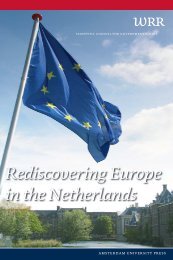The Western Condition - St Antony's College - University of Oxford
The Western Condition - St Antony's College - University of Oxford
The Western Condition - St Antony's College - University of Oxford
You also want an ePaper? Increase the reach of your titles
YUMPU automatically turns print PDFs into web optimized ePapers that Google loves.
An ambivalent decade: Three variations in the AKP’s foreign policy<br />
names deemed to be either too independent or too close to Abdullah Gül, his long-time<br />
comrade but potential rival in a future presidential race.<br />
<strong>The</strong> collusion <strong>of</strong> domestic and foreign politics and Erdoğan’s vision <strong>of</strong> himself at the centre <strong>of</strong><br />
the party, the party at the centre <strong>of</strong> Turkey, and Turkey at the centre <strong>of</strong> a vast Muslim domain<br />
corresponding to the former Ottoman territories and beyond were powerfully conveyed in the<br />
victory speech that the prime minister delivered on the eve <strong>of</strong> the 2011 election from the balcony<br />
<strong>of</strong> his party’s imposing headquarters in Ankara. “Believe me,” he said, addressing tens <strong>of</strong><br />
thousands <strong>of</strong> passionate supporters,<br />
“Sarajevo won today as much as Istanbul, Beirut won as much as Izmir,<br />
Damascus won as much as Ankara, Ramallah, Nablus, Jenin, the West Bank,<br />
Jerusalem won as much as Diyarbakir.” 93<br />
<strong>The</strong> AKP had just run its most self-congratulatory and confrontational election campaign.<br />
Pandering to the supporters <strong>of</strong> the far-right opposition Nationalist Action Party (Milliyetçi<br />
Hareket Partisi, MHP) in an attempt to keep it below the 10% election threshold that would give<br />
the ruling party the absolute majority required for unilateral constitution making powers, the<br />
AKP adopted an aggressively nationalistic rhetoric with sectarian undertones to attack both the<br />
pro-Kurdish Peace and Democracy Party (Barış ve Demokrasi Partisi, BDP), which had<br />
succeeded the outlawed DTP, and the secularist CHP, where the hardliner Kemalist old guard<br />
has been engaged in a power struggle against a younger leadership advocating a cautiously social<br />
democratic programme. 94<br />
At almost every campaign stop, Erdoğan made subtle yet stinging remarks to remind his<br />
audiences that the new leader <strong>of</strong> the CHP, Kemal Kılıçdaroğlu, was an Alevi, thus contributing<br />
to the hegemonic discourse <strong>of</strong> prejudice and discrimination that the government’s Alevi opening<br />
was meant to counter. 95 At the same time, in a bid to maintain the party’s support among the<br />
conservative Sunni sections <strong>of</strong> the Kurdish population in the face <strong>of</strong> the government’s<br />
increasingly militaristic policies, the AKP decision makers chose to exploit sectarian sensitivities<br />
among Kurds. <strong>The</strong>y repeatedly claimed that the members and supporters <strong>of</strong> the pro-Kurdish<br />
movement, many <strong>of</strong> whom are leftists and/or secular nationalists, lacked proper Islamic beliefs<br />
and morals. This has continued beyond the election, with such examples as the newly appointed<br />
93 Kerem Öktem, Ayşe Kadıoğlu, ‘Introduction’, in Another Empire, p. 4.<br />
94 Over the years, especially since the collapse <strong>of</strong> its Kurdish, Alevi and Armenian ‘openings’, the AKP’s rhetoric has<br />
frequently overlapped with that <strong>of</strong> the MHP, as the ruling party increasingly appealed to religious nationalist voters,<br />
who make up the MHP’s core constituency. While there appears to have been some movement <strong>of</strong> support from the<br />
MHP to the AKP, this was not enough to push the MHP below the election threshold, as it ended up receiving 13%<br />
<strong>of</strong> the vote. <strong>The</strong> two parties went on to cooperate closely in the new parliament, with the MHP acting as the<br />
un<strong>of</strong>ficial junior partner <strong>of</strong> the ruling party on a number <strong>of</strong> issues.<br />
95 Sedat Ergin, ‘Erdoğan and the CHP leader's Alevi origin’, Hurriyet Daily News, 18 April 2011.<br />
40

















